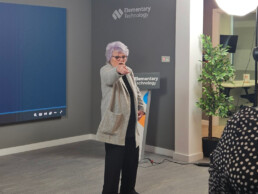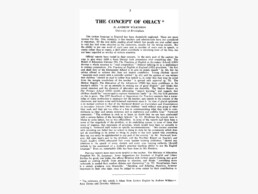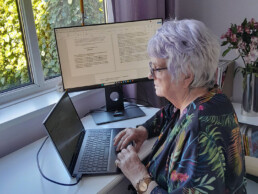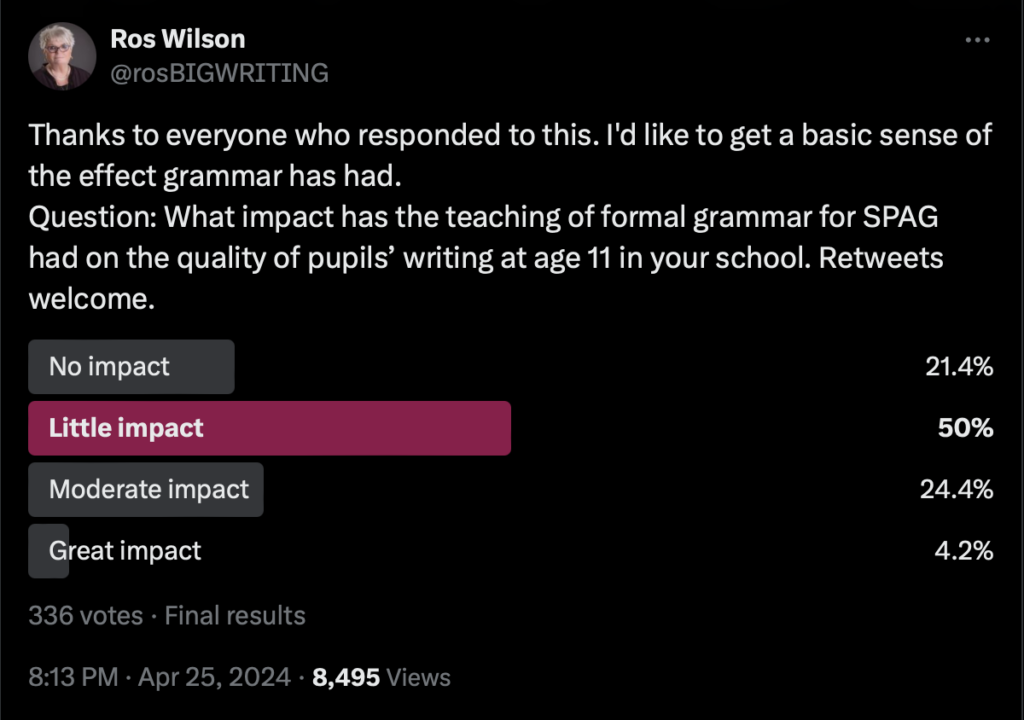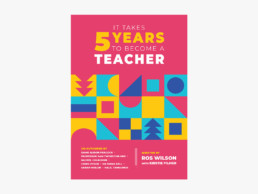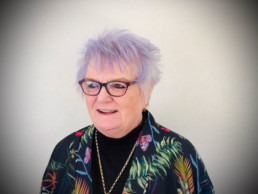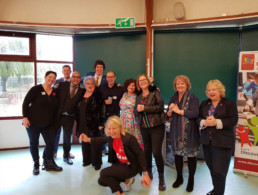School Speak Oracy
I was sent a link to an ongoing discussion on Twitter about the ethics of teaching children who do not speak in Standard English to do so. There are clearly many people who feel great sensitivity around this area – and that is totally understandable.
One of the schools I work most closely with is in an area of massive deprivation, with almost the entire pupil body speaking either in strong Yorkshire accents or with cultural ones. Their teachers and support staff, most of whom also speak with regional accents (although less than half the teachers are from Yorkshire, while all the support staff are from the locality of the school) have embraced the necessities of children learning to speak in the standardised form of English. They have long used my maxim: ‘If a child can’t say it, a child can’t write it,’ and this is now modified to:
‘If a child can’t say it in Standard English, a child can’t write it in Standard English.’
Children must learn to speak confidently and articulately in Standard English if they are to think in the standard form and therefore write, proof and edit in it, but this does NOT mean that they can no longer enjoy and celebrate their own local accent.
The risk of offence or humiliation for children in learning Standard English is not the ‘what’ but the ‘how’. By including the standardised form of English as one of the ‘codes of speech’ pupils will hear around them in their lives – whether in shops, in restaurants, on streets, on transport, on television or on other media – and teaching children to respect all these forms of speech, the stigmas are removed and the elitism is eradicated. We then teach them to switch easily between forms (this is called code switching) whilst having fun – often through role play and performance – and with practice this becomes a smooth transition from their own home accent into other forms of their choice for purpose, but always including models that are entirely in Standard English.
Sadly, some in the profession have not yet understood that Standard English may still be spoken with a regional accent – it purely means that all grammar and pronunciation will be accurate. Where alternative grammatical and vocabulary forms exist that are not in the accepted standard form, speech becomes a dialect (again, a wonderful thing to be celebrated. I love Yorkshire dialects).
Included in the children’s increased repertoire of readily-available forms of speech, however, will also be ‘received pronunciation’ – or the accent of many of the highly educated or the wealthy – formerly known as ‘BBC English’. This is treated purely as another code of speech in their repertoire, and children will use it in role play, drama and presentations in the same way as they will use other codes. We have renamed this code ‘School Speak’ in our oracy programme, and encourage schools to modify that to the name of the school (for example, Roundwood Speak) if they so choose.
Thus, we make ‘School Speak’ an inclusive form that every child and adult in the school will use when asked – whether as the sustained form of speech for all throughout one or more entire lessons a day, or for specific purposes such as a debate, a performance (for example, of poetry) or as a particular character in role play. ALL children sharing the same speech form for the same purposes at the same time… equality with mutual respect – and then all children reverting to the daily speech code of their choice… again, equality with mutual respect!
I have just enjoyed writing a short book for publication as a PDF to help schools to launch and support development of powerful oratory in their schools with dignity. This very affordable book will include resources to support teachers and pupils in developing their exciting and highly entertaining orations for school gatherings and celebrations. More information will be available on our website soon.
Through this means of embedding School Speak in fun and dramatic performances, children will find, as time progresses, that switching from their daily voice, local accent or ‘street talk’ into an impressive form of oratory when appropriate, to be a natural and rewarding experience that will support them in their life as they represent their class, their school and their family, as they attend interviews and as they interact with people of other speech forms in the wider world.
There is no shame in this achievement – only joy and celebration of choice and flexibility. Where else will children develop this empowering and life-changing skill? The clue is in the name – ‘teachers’. We are the teachers, we should empower and enable without being made to feel shame or derision.
Only a week or so ago, a secondary teacher tweeted explaining how he modelled speaking in modified standard English, using sophisticated features and in expressive tones of respect and oration when speaking to all his students in school, and how so many were beginning to reply in a similar vein, modifying their local ‘street talk’ without the need for judgmental comment or potentially humiliating teaching. I wonder, sometimes, whether all our secondary colleagues – who we value so highly – are aware of how hard we work to prepare our pupils for secondary education?
We TEACH them…
…and so often a challenging aspect of learning in one phase of education later becomes a revisit – reawakening memories that are deep seated in the sub-conscious and enabling them to be refreshed, extended and invigorated with the maturity of the years and giving the impression of an ease of learning that belies the hard work of the previous phases.
Never feel shame about teaching children something that could potentially enrich and reform their life opportunities, for we all know that TEACHERS MAKE THE DIFFERENCE.
Talk:Write
A fun and flexible approach to improving children’s vocabulary, speech, and writing.
Oracy Is Not Just Speaking and Listening
I visit schools who are doing ‘oracy’ and I see speaking and listening! Mind you – I am so pleased to see children conversing and teachers asking a wealth of interesting questions – but it ain’t oracy. Speaking and listening is valuable; oracy is valuable – they overlap and have elements in common – but they are different. It remains confusing because, inevitably, you see and hear one in the other and vice versa and often the boundaries are very blurred.
So, what IS oracy and how do I know what it isn’t when so many great teachers and leaders think they are ‘doing’ it? Well, to be fair it has taken me over two years and a lot of hard work to come up with an answer that may solve that mystery.
You see, Andrew Wilkinson did not know the answer himself when he came up with the terminology in 1965. How can you create a new ‘something’ to teach children when you do not yet know what the ‘something’ is? It is important to be able to define your vision before you attempt to communicate it to others. That is why new thinking and new ideas often have slow and shaky starts until the definition is crystal.
Wilkinson’s aspiration was good, however, he wanted to raise the profile of talk and language so that it was NOT just speaking and listening. He created the name ‘oracy’ to put his new aspiration on a par with numeracy and literacy and he developed a massive and much underrated national initiative to promote it, but he still didn’t know what it was and neither did most of the country.
There is so much written about the cruciality of oracy, and I have read much of it, but nowhere do you truly understand what it means. Voice 21 has established itself as an authority, saying;
We believe that schools have the power to change a child’s life and create a fairer society. We support schools to build oracy into learning, the curriculum and wider school life. Oracy is the ability to speak and listen in a range of different contexts – one-to-one, in groups and to a larger audience. Oracy skills set children up for success in school and life.
So what is it? Well, perhaps Voice 21 is close to defining ‘oracy’ when it tells you what you will see and hear in schools they work with:
In Voice 21 schools, you will hear students solving problems collaboratively in maths and dissecting arguments in history, talking through conflicts in the playground and leading assemblies.
So close to a definition – but not! Was Andrew Wilkinson influenced by Sir Evelyn Wrench when the latter said that effective discussion and communication had four components:
- reasoning and evidence;
- organisation and presentation;
- listening and response;
- expression and delivery.
Wrench, a former journalist, had seen his original international communication organisations morph into the promotion of discussion and communication between young people around the world in order that they might better understand each other and show mutual respect by the mid-1960s, before he died.
Wrench (1882 to 1966) saw international co-operation and communication as crucial for world peace and his summary of the four components for his aspirations possibly reflect the aims of Voice 21:
Voice 21 sets out four strands of oracy – Physical, Linguistic, Cognitive and Social and Emotional. The ‘physical’ includes elements such as voice projection, using eye contact and gesture. ‘Linguistic’ involves using appropriate vocabulary and choosing the right language for different occasions; ‘cognitive’ is about organising the content of your speech and ‘social and emotional ’ includes working with others, taking turns and developing confidence in speaking.
Ah, now it is becoming clearer. In identifying the four components of communication promoted through his work, he was embracing the best of speaking and listening – a best that verges on oracy and sometimes becomes it.
Wilkinson’s aspirations for the National Oracy Project (1987 to 1993) were established as a key contribution to the early National Curriculum. However, Wilkinson himself struggled to define the term – eventually coming up with a statement he immediately felt was inadequate for the job. In his own words, Wilkinson said that oracy was;
…the verbalisation of experience.
As he promptly acknowledged his dissatisfaction with this, a colleague suggested that perhaps it was rather;
…the experience of verbalisation…
whereupon Wilkinson seized the diametric and married the two. I read them, I understood them, but I knew not what they meant.
I was extremely fortunate to be invited to participate in the Bradford strand of the National Oracy Project upon my return to the United Kingdom in 1986 after 17 years in the Caribbean. I had no training, no induction or introduction, no materials and attended no meetings but I much enjoyed working with my 13-year-old Middle School pupils on communication skills and we all developed a passion for the huge effectiveness of talk, debate and discussion on our studies. We ‘did’ speaking and listening in the best sense of the word. We talked endlessly about the power of talk and the role inspirational discussion plays in understanding learning, clarifying it, embedding it and moving it forward.
We benefit so hugely from the first three elements of Wrench’s description, but we do not often – in the busy overloaded world of education in England – move through to that final stage…
For the past two years I have studied, reflected on and written about oracy, and finally I feel my understanding reflects Wilkinson’s diametric. I have watched communication and discussion radically improve in the schools participating in our trials, but the key element is still in development. And then – while enjoying a dramatic performance of a verbalisation of the experience of analysing a response to a mythical image – the penny dropped as the missing word fell into place.
It is an oral performance of an experience, performed with passion and dramatic communication. It takes creativity, skill, rehearsal and interpretation… but oh it is so powerful in its illustration and conveyance of the impact of an experience that must have been 100% understood, absorbed and embraced to be verbalised through oracy.
It is exciting to be on the fringes of the birth of the Oracy Commission:
The Commission on the Future of Oracy Education in England is an independent commission, chaired by Geoff Barton and hosted by Voice 21.
I see with interest that their discussions and contributions follow that same pathway that I have been struggling along with so much joy and enlightenment. Now I have words to express what I was fortunate to have been given by an articulate and inquisitive family at the kitchen table in the days before TV and media – an ability used all my career without ever knowing how to define it. This was not a gift of class but rather a gift of culture. We were genuinely impoverished financially but blessed in ability to use language. Now every child in the country and the world may have the great good fortune to acquire those same skills.
Of course I was unable to define oracy, I was still in the understanding and absorbing phase – as so many others are still today. It is everything both Welch and Wilkinson said and everything Voice 21 has said. You can’t achieve oracy without speaking and listening but you can usefully and productively use speaking and listening in education without taking it on that final, massive-for-many climb into oracy.
Now we know it, let’s get our boots on…
Talk:Write
A fun and flexible approach to improving children’s vocabulary, speech, and writing.
Technical Grammar in Primary
I recently started a Twitter debate about the merits and disadvantages of the formal teaching of technical terminology for grammar. The consensus seemed to be that the only advantages for the teaching of primary aged children were if a school wanted children to perform well in the SPAG tests in Year 6! As ever, there was some advocacy for the benefits for MFL teaching in secondary schools – however, the majority of primary school leaders do not seem to see preparing pupils for success in secondary MFL exams as a priority for primary education.
Over 70% of the colleagues who responded to the poll we circulated on teaching myriad technical grammatical terminology that was included (by statutory requirement) in the revised National Curriculum of 2014 – without consultation – concluded that it had little or no impact on pupils’ writing prowess in Year 6. Indeed, a significant number of comments indicated that writing had lost a lot of its zest and had become more of a technical chore. Over 20% of respondents thought the benefits were minimal to none. One comment noted improvement to understanding rules of punctuation and the others related to later benefits in secondary education.
If children already have a good understanding of more complex grammatical structures and are able to use them effectively in their writing, then the later learning of the formal terminology is made easier and has purpose and meaning. The problem with the grammar requirements imposed is that they require the formal teaching first and then the later explanation of what it means and why a writer might need it. It reminds me strongly of the textbooks we used for learning grammar when I was at secondary school back in the 1950s.
Thinking of these led me to google grammar textbooks of the 1950s and to my surprise the search picked up on grammar today, and the first items identified were all blogs or similar by esteemed writers or educators criticising the imposition of the technical grammar for SPAG.
Michael Rosen’s blog of March 2016 makes protest about the introduction of SPAG. He provides a sample 11 plus paper from that era and says:
You can see what kind of ‘grammar’ questions we had in the 11 plus exams in the 1950s here. It was limited, as I have said, mostly to using the simplest terms – noun, verb, adjective, adverb… and the simplest stuff on tense. The questions mostly involved ‘filling in the gap’ type, so at least you had the context of that sentence to get it right. I’m not saying that this was ideal either, but it was fairly limited in terms of the amount of time we spent doing it and how much emphasis there was on doing it.
Even so, this was part of the means by which the 1950s system failed at least two-thirds of all children. It is quite unfair of Nick Gibb to claim that this is what’s being ‘brought back’. A much more complex raft of terms and processes are in SPaG and it’s one of the main means by which schools and teachers are being judged.
In ‘The Wrong Way to Teach Grammar’, Rachel Cleary (The Atlantic, 2002) says:
A century of research shows that traditional grammar lessons – those hours spent diagramming sentences and memorizing parts of speech – don’t help and may even hinder students’ efforts to become better writers. Yes, they need to learn grammar, but the old-fashioned way does not work. This finding – confirmed in 1984, 2007, and 2012 through reviews of over 250 studies – is consistent among students of all ages, from elementary school through college. For example, one well-regarded study followed three groups of students from 9th to 11th grade where one group had traditional rule-bound lessons, a second received an alternative approach to grammar instruction, and a third received no grammar lessons at all, just more literature and creative writing. The result: No significant differences among the three groups – except that both grammar groups emerged with a strong antipathy to English.
And Rachel was discussing the impact of formal grammar in secondary schools.
In a desperate urge to be democratic and quote both sides of the argument I then put ‘support for teaching technical grammar at primary school’ into the search engine and the following came up: Teaching Technical Grammar Terms Doesn’t Improve Children’s Writing (Dominic Wyse, Teachwire, 2024). Dominic says:
We now have the benefit of a significant amount of research to inform the ways in which writing can, and perhaps should, be taught. I have recently contributed to this research in two ways. Firstly, I’ve undertaken an analysis of the research evidence on whether the teaching of formal grammar helps writing. Secondly, I’ve also undertaken a four-year study of writing from a range of perspectives including philosophical, historical and empirical research studies addressing writing across the life course… In addition to more than 150 individually specified elements of spelling and five pages of detailed specification of grammar (that are statutory), primary teachers in England are required to teach and assess their pupils’ knowledge of a range of terms, including compounds, suffixes, determiners, cohesion, ambiguity, ellipsis, modal verbs and lots more. It is presumably intended that the learning of these terms will help children to write better because they are included in the programme of study for writing, yet the evidence is clear – traditional grammar teaching does not lead to improvements in children’s writing.
All in all, articles and blogs critical of the NC 2014 grammar requirements far outweigh support for the arbitrary decisions of the then non-educationalist Secretary of State for education and confirm my despair that a succession of changes of leadership has failed to address the lack of judgement in the English curriculum criticised by so many. The degree of detail required by the inclusion of technical terminology for grammar in the 2014 NC is absolutely unnecessary for effective writing by pupils up to fourteen years old and has no impact on communication, creativity or composition. This level of learning is only necessary for those seeking higher level qualifications in the area of linguistics.
I conclude this blog with the wisdom of Simon Kidwell, President NAHT, in his blog, published by Teachwire in 2022:
Since 2014 I have spoken to a senior politician at the DfE and to experts in the field of teaching grammar, and I am yet to meet anyone who believes that the current grammar curriculum for primary schools is fit for purpose or age-appropriate. One teacher, Alison Vaughan, commented: “The overloaded grammar curriculum holds back learning for those with poor working memory and slow processing. These students are already working hard to remember punctuation and spelling… They need more time consolidating the basics, not complex terminology.” My colleague, headteacher Michael Tidd, added: “I think some of it is just pointless at primary level (I’m looking at you, subjunctive form!) and ends up being overly simplistic because of that…” Objections extend beyond the classroom, too, with The Times reporting that the government’s key curriculum adviser, Tim Oates, said that there was a “genuine problem about undue complexity in demand” in the content of 2016’s SPaG test. A lot of the issue, then, is with curricular sequencing, or a lack thereof. The teaching timeline for these complex concepts is out of whack, and we need to reconsider at what point we should be expecting our pupils to understand and absorb them.
Simon Kidwell has worked as a headteacher and school principal for 17 years, and has led three successful primary schools to achieve rapid and sustained improvement.
It is distressing to see political leaders, who appear to be totally lacking in knowledge or understanding about the needs and abilities of pupils in primary education, ignore the wealth of knowledge and opinion expressed by primary leaders and experts. If, as Simon Kidwell intimates, the NAHT is ready and able to take the lead in decision making for education, we may at last see curricular reform that reflects the true principles of education for our pupils. Simon closed the powerful 2024 NAHT Conference with the words; “The solutions to the challenges we have exist in this room.” May our talented heads rise to those challenges and bring stability and strength back to our profession.
Talk:Write
A fun and flexible approach to improving children’s vocabulary, speech, and writing.
Reflections on It Takes 5 Years to Become a Teacher
It is now 4 years since we published ‘It Takes 5 Years to Become a Teacher’, and it is gratifying how popular this little book has become. Besides the main body of my personal biographical experience and myriad advice and tips, there are a significant number of case studies full of the early days of a range of colleagues from all over the country and the world.
Recently, I have so enjoyed dipping back into these case studies, savouring the rich mix of experiences from the first years in the classroom and amusing tales of blunders and mini disasters that never fail to make me chuckle. I shall always be grateful for the plethora of colleagues who so generously contributed their memories of those first years in the profession.
What the writing and compilation of this book shows so clearly is that no amount of university study and brief placement experience can prepare us for the totally unexpected and unpredictable mishaps and moments of bliss that working with children brings. It is that very unpredictability that makes no amount of training, coaching and study able to prevent or adequately prepare us for. Many of us – seemingly well prepared and geared up for this new adventure – found the first weeks ran smoothly with compliant pupils and sweet successes – and then the trials began. Small difficulties and unexpected glitches began to confront us and exposed our naivety, tempting some pupils to test us and seize the opportunity to amuse their peers with antics of a class clown. The worst events, however, were often those that were purely the outcome of our own lack of experience and thus slow or inappropriate reactions.
Teaching is a wonderful career, diverse and different from minute to minute. It is hard to think of another profession where, for six hours a day (seven, but with two short breaks), an individual is unable to sit down and relax, sip a coffee or a coke, nibble a biscuit or suck a sweet or make or answer a quick phone call. Other professions that handle life can snatch a couple of minutes between cases – but not teachers. Save for a short toilet stop at morning play and an average of 20 minutes of the 45 to 60 minute lunch break, we are constantly vigilant, orating, articulating, chattering, conversing, discussing, echoing, enunciating, expressing, pronouncing, ranting, repeating and generally performing – dynamic, dramatic and vigorous.
We are thespians, scientists, astronomers, explorers, researchers and debaters. Does any other profession that is not on the stage wear so many cloaks? Adopt so many roles? It is our privilege to interest and engage, to motivate and excite, to charm and persuade, often with charisma and wit – even when we are exhausted, under the weather or in the midst of some personal crisis in our private life.
Rereading this summary of features of life for those of us with the privilege of working daily in the classroom, I wonder how we do it and how we sustain it day in and day out, in all weathers and throughout all the normal traumas life brings – and particularly how we did it as young and innocent newcomers to the profession. No wonder there were times when we struggled, times when we questioned our abilities and our commitment. And then there was the ever-increasing mountain of paperwork, most of which has no bearing on our daily ability to teach effectively; much of it imposed by those who have never experienced this career we have chosen and have no in-depth knowledge of what we go through day in and day out.
Yet we survive, we battle on and slowly the sun rises and all falls into place and clarity dawns. We are never safe from the unexpected, but our competency to cope and to lift our heads and deal with the day-to-day crises and chaos with confidence and clarity grows and blossoms as we truly become effective and efficient teachers. So, have faith, learn to laugh at yourself and talk endlessly with trusted colleagues, family and friends as you find your way, blossom and grow.
Talk:Write
A fun and flexible approach to improving children’s vocabulary, speech, and writing.
Oracy in Practice
In my last blog I compared the simplistic definitions of oracy found in popular dictionaries – mainly being alternative ways of saying ‘speaking and listening’ – with the impressive analysis of The English-Speaking Union, founded in 1918 by Sir Evelyn Wrench. My summary of these findings, in the first blog, was that these are the skills of research, communication of findings, debate and presentation. THIS is oracy, the ability to not only speak, but to adapt speech, selecting and refining – and ultimately to write if that is the goal – for audience and purpose.
Currently, I am working with a school very close to my heart on the development of oracy. The two newly appointed lead leachers are excited and enthusiastic about the proposed programme for embedding oracy across the school in everything they do. They know that the children’s learning will be so much better, richer and more comprehensible with an oracy driven approach – reflecting authentic ‘talking to learn’ – and that children’s learning will also be more accurately assessable through speech – but they also know that the children’s oracy will itself improve and become the school’s own style of speech, ‘school suave speak’ in constant use throughout every lesson, and this is a school where the majority of the children have a strong Yorkshire accent or dialect, like myself. We are already celebrating that accent in this school, and pupils are having fun code switching between their Standard English, school suave speak and their informal, Yorkshire daily speaking voice. Talk:Write is not about judgement and disparagement, it is about adaptability – having appropriate speech forms for purpose.
In this school, pupils are already using oracy techniques to embed up to three new suave words a week, deploying them successfully in communication both through speech and writing. Further, they are creating short, fun dialogues between characters speaking in different speech forms and are also embedding suave sentence structures for use in presentations – both oral and written. The most recent addition to their portfolio of oracy activities will involve 30 minutes being devoted to each child in the class forming a suave sentence to explain which aspect of learning – in any subject – they found most interesting or exciting each week. They will open the sentence with their own chosen suave opener and include one suave word of their choice from the many suave words they have already embedded in classrooms throughout the school. They will practise their oral delivery with friends and then each will, in turn, deliver their sentence to the class. If anyone wishes to respond, they may raise one finger and then will be invited to do so with an appropriate response, such as: ‘Jonah, I see you wish to comment?’ Tables will usually be arranged in an open horseshoe to facilitate this introduction to the future skills of debate, to be focused on next year.
To this end, each class is being provided with a list of oracy openers for display, to start the process rolling. These include statements like:
- ‘For me, the moment of greatest area of interest this week was…’
- ‘Undoubtedly, the most exciting moment for me this week was….’
- ‘Overall, I feel the most fascinating learning of the week has been…’
- ‘As I think about my learning across this week…’
- ‘I have enjoyed so much of my learning this week, however, I feel that …’
- ‘Despite enjoying almost all my learning this week, one item especially…’
- ‘Although I have thoroughly enjoyed my learning this week, of particular enjoyment was…’
- ‘An outstanding aspect of learning for me this week was…’
- ‘With great difficulty, I have identified learning about XXXXX as the most fascinating…. ‘
And so forth.
Throughout the term, children will be encouraged to experiment with these forms as they produce their weekly comment, restructuring and mixing and matching from the start, in order to personalise them and to widen the range heard and used. In the last week of each term or half term, each child across the school will then select the one they performed that they enjoyed most that term, writing a short paragraph on that learning. They will share this with friends, building in suave features of language, being creative with structures and rehearsing oral presentation through constant re-reading and rehearsal, with some – hopefully – learning from memory. Then each class or year will have a presentation session where every child presents their speech and the one or two voted best to represent their class will go forward to a whole-school performance in assembly.
The following are exemplar steps in the process for Jonah, aged 10:
- His curriculum statement in his class’s contribution to weekly assembly:
‘An outstanding aspect of learning for me this week was our research into the impact of global warming on weather throughout this winter, 2023/24.’ - Jonah then worked with Daisy and Leon to turn this contribution, and each of theirs, into suave speak paragraphs. The following is Jonah’s, but Leon contributed the word ‘engrossing’ for Jonah and Daisy checked the range of suave openers used by Jonah, concluding he had used a good range without overdoing things. The following is Jonah’s finished paragraph:
‘An outstanding aspect of learning for me this week was our research into the impact of global warming on weather throughout this winter, 2023/24. This project commenced with our collecting data on weather patterns throughout the past decade in Yorkshire in winter, using information from The Yorkshire Post and the BBC, besides the local internet weather site. Ultimately, this led to comparisons with data from recording the weather throughout December, January and February, using daily temperature and climactic measures and the internet. All in all, this proved an engrossing piece of research that led us to conclude that our weather had been both far warmer and wetter than the usual winters experienced in my lifetime.’ - At the March year assembly, Jonah performed his paragraph as one of three representatives for his class. He had rehearsed it a total of eight times with his friends and at home with his family, practising his inflection, projection, pronunciation and pace – his class’s agreed targets for school suave speak.
- Although Jonah did not know all his speech by heart at the Easter assembly, he used a modified form for his summer term presentation on the subject of research into the origins of the Yorkshire dialect, his chosen learning from that term, which he performed in late June entirely from memory with no script.
We hope you have enjoyed this snapshot of real-life oracy teaching. I hope to keep a record tracking progress in two very different schools over the coming calendar year, sharing outcomes and ideas as we proceed.
There are now resource sheets on oracy openers which will be available on the website from April.
Talk:Write
A fun and flexible approach to improving children’s vocabulary, speech, and writing.
Oracy: Is that All it Is?
For those of us who were teaching in state school classrooms in 1989 and beyond, the introduction of the original National Curriculum for England came as a total shock. We were in no way prepared for it. We received no helpful training or induction. Colleagues working for Local Authorities appeared to be only a short paragraph ahead of us in their understanding.
As a head of English in a middle school, I naturally focused my initial energies on the curriculum for English, with its three distinct sections; AT1: Speaking and Listening, AT2: Reading and AT3: Writing. I found, as did many others, that the Speaking and Listening said little, expected less and interested no-one. It stood alone, in isolation.
I was, however, extremely fortunate to be invited to take part, with our pupils and staff, in the National Oracy Project – with its wealth of materials and resources – piloted from 1987 to 1993 to support the development of speaking and listening skills. This re-enforced my career-long passion for the priority of oracy in education and pupils’ future lives. However, my move to primary in 1990 to become assessment lead led to my embracing the entire curriculum, except for English AT1.
In 2013, the revised National Curriculum renamed AT1 ‘Spoken Language’ but its introduction still maintained clear separation between the two most integral skills of oracy. I quote:
The quality and variety of language that pupils hear and speak are vital for developing their vocabulary and grammar and their understanding for reading and writing. Teachers should therefore ensure the continual development of pupils’ confidence and competence in spoken language and listening skills.
Is THAT all it is?
This revised English curriculum takes up almost half of the entire National Curriculum for Key Stages 1 and 2 with its 11 intrinsic subjects and 4 associated subjects, and yet – after just over a side on Spoken Language for all of Key Stages 1 and 2 – it is almost entirely devoted to spelling, grammar and punctuation rules. And thus, the National Curriculum has persisted in paying lip-service to the crucial skills of oracy by refusing to acknowledge the need to embed the two skills as one for children’s learning and development.
Indeed, the world of education failed to truly embrace the creation of the concept when it was first developed by Andrew Wilkinson in the 1960s. He created the name ‘oracy’ by analogy from the terms ‘literacy’ and ‘numeracy’.
Wilkinson executed this revolutionary perspective in response to the perceived neglect of the skills of oral communication in education 64 years ago – and it has only recently been discovered by the majority of the world of education in this millennium.
According to Wilkinson’s conceptualization, oracy in educational theory is the fluent, confident, and correct use of the standard spoken form of one’s native language. It also established a standard where students’ abilities are developed within an integrated program of speaking and listening, reading and writing. Recent studies also equate oracy with the notion of “talking to learn” within the perspective that knowledge is constructed by the individual knower, through an interaction between what is already known and new experience. An example of oracy-based education initiative was the UK’s National Oracy Project, which recognized the role played by classroom talk and put equal treatment between spoken and written modes. (Wikipedia)
In The Concept of Oracy (1970) Wilkinson says that, when asked to qualify ‘oracy’ in only three words, he defined it as the ‘verbalisation of experience’ – expressing our own experiences and ideas, but was never satisfied that covered all bases until he realised he could re-order the words: ‘the experience of verbalisation’ – listening to the experiences and ideas of others. I agree with him that the two definitions together paint the whole picture.
Listening is intrinsic to speaking – the two should never be separated conceptually. The child learns to speak through hearing speech, subject to speaking and listening ability:
- The more the parent/s or carers of a young child talk with that child, the more the child will talk.
- The wider the vocabulary that same adult uses, the wider the vocabulary the child understands and eventually uses.
- The more often a word is repeated in a range of contexts, the better the child will understand and embed it.
- If the adult who talks to the child for most or all of its first years, talks with a local accent, the child will talk with a local accent.
- If the adult talks in dialect, the child will talk in dialect.
- If the adult talks in Standard English (correct grammar and pronunciation) the child will talk in Standard English.
- If the adult talks in received pronunciation, the child will talk in received pronunciation.
- If the adult uses dialogic constructions in language, the child will use dialogic constructions.
These are facts, simple and clear. If we want children to be competent and confident speakers, presenters, writers and debaters, we MUST fill their lives with these models through constant exposure and active participation in oracy.
The ability to adapt speech for purpose is a strength, not a weakness. Being able to code switch into local accent or dialect is not a negative, as long as it is a choice and not the only form the individual has.
The English-Speaking Union was founded in 1918 by Sir Evelyn Wrench, with the aim of English-speaking democracies working together to build international fellowship and, ultimately, peace. It now devotes the majority of its work to developing young people’s skills of oracy in schools around the world. This organisation defines the skills of oracy as having four components:
- Reasoning and Evidence
- Organisation and Prioritisation
- Listening and Response
- Expression and Delivery
I found this inspirational; these are the skills of debate and presentation. THIS is oracy, the ability to not only speak, but to adapt speech, selecting and refining – and ultimately to write if that is the goal – for audience and purpose. Remember my historic maxim? If a child can’t say it, a child can’t write it. A reasoned argument for ‘A’ Level or for a Doctorate is seeded at the adult’s knee in the first seven years of life, and it blossoms (or not) and grows as that child moves through education.
In his letter to the Secretary of State, 30th September 2020, Robin Alexander (University of Cambridge: ‘Improving oracy and classroom talk in English schools: achievements and challenges’) presents six propositions:
-
We have known for a long time that talk is essential to children’s thinking and learning, and to their productive engagement in classroom life, especially in the early and primary years. We now have additional evidence, from over 20 major international studies, that high quality classroom talk raises standards in the core subjects as typically measured in national and international tests.
-
There can no longer be any doubt that oracy should feature prominently within the statutory national curriculum.
-
We need a different kind of talk from teachers in order to extend the repertoire of pupil talk and raise the standard and cognitive impact of classroom talk overall.
-
Though the terms ‘speaking and listening’ and ‘communication skills’ indicate objectives of indisputable educational significance, they have become devalued by casual use and should be replaced by terms that signal the emphatic step change in thinking and practice that is needed. ‘Oracy’ is a neologism which some find unappealing; ‘spoken language’ fits the bill reasonably well, though it doesn’t have the connotation of acquired skill that, by analogy with literacy, ‘oracy’ possesses.
-
There is a strong case for revisiting the 1975 Bullock Report’s advocacy of ‘language across the curriculum’ in order to underline the argument that educationally productive talk is the responsibility of all teachers, not just those who teach English.
-
Since this is about the quality of teaching as well as the content of the curriculum, it has implications not only for the NC review but also for initial teacher training, CPD, inspection and professional standards.
Alexander goes on to note that the ‘Cambridge Primary Review’ took the penultimate point further:
We recommend that in addition to the programmes of study of English, there should be a clear statement on language across the curriculum which requires attention in all subjects to the character, quality and uses of reading, writing, talk and ICT, and to the development of pupils’ understanding of the distinct registers, vocabularies and modes of discourse of each subject.
The Cambridge Dictionary defines oracy as:
the ability to speak clearly and grammatically correctly.
It is SO much more!
In my next blog I will exemplify one or two of the oracy activities I have seen embedded in lessons recently in schools.
Talk:Write
A fun and flexible approach to improving children’s vocabulary, speech, and writing.
International Women's Day
I lay in bed and listened to the 24-hour news. A young lady kidnapped, abused and murdered by a policeman. Women saying they are afraid to walk our streets at night. I am afraid to walk our streets at night. Was it ever thus?
I used to stop on my way home from school at the garage of the wealthy elderly woman across the road from us. Mr. Pearson – her chauffer and mechanic – sat me on his knee, gave me sweets and stroked my bottom inside my knickers. I liked the sweets. I was 11.
When I was fourteen, Alex asked me out. We met through chapel and I knew he had just ‘broken up’ with his girlfriend of 2 years. I also knew he was not over her and that I was second best, but I was pleased to be asked. He was very 16 and very attractive, and I was flattered. On our second date we went on the tram to Harehills. In those days Harehills was a thriving hub of coffee bars and the first ever Chinese restaurant in our locality of north Leeds. Alex and I had an expresso coffee In Hernsndo’s where my sister worked (and I would part time in one more year). It felt so sophisticated
When we left the coffee bar, we walked down to the main road between Leeds and its suburbs. As we approached the tram stop a group of about 6 lads in what was known as ‘teddy boy’ gear (drainpipe trousers, long jackets with velvet collars and long hair tied back) fell into step behind us. They followed us to the tram stop, boarded the tram behind us and seated themselves downstairs at the rear by the exit while we went upstairs.
As we disembarked at Oakwood clock, the gang of lads also rose and followed us off the tram. They strolled along Wetherby Road behind us, speeding up as we sped up. Alec and I never spoke. We did not acknowledge their presence. I was afraid. I dare not say so.
We turned up Ladywood Road. The lads crowded in on me and Alex crossed the road, keeping pace but separate. They crowded round me, then started groping me. It was autumn and I had a thick coat on. At first, they explored my private parts through the thick blue and green shaggy coat, but then they started to reach inside… laughing and shouting and encouraging one another.
Alex walked on the opposite side of the road with his head down. I was very afraid.
A car turned the corner from Springwood Road into Ladywood Road. Cars were rare in those days, especially after dark. It was 1958.
The lads panicked, they shouted at each other and they ran back the way we had come. Alex crossed the road and asked if I was OK. I said I was. He walked on up the road and I turned down our unmade private road to my home. He didn’t ask me out again, in fact we never spoke again and within two weeks he was back with his original girlfriend.
It was International Women’s Day. I have never told anyone about the events of that night, and I have never felt comfortable being out by myself after dark.
Filmclasspod
Recently, I was privileged to record a podcast with Shain and Sean for @filmclasspod. When I agreed to doing this, I had assumed that we would be talking about children’s writing, my work or my recent books. Wrong! Guess who hadn’t done her research well enough? Shain and Sean were in the middle of recording a series of interviews with people known in the world of literacy – specifically, at this time, focussing on JK Rowling and the Harry Potter Series.
“Of course, that’s fine.” I confirmed with a gulp – not daring to point out that I had never finished reading the series. “I’d especially love to discuss the very first book…”
“Oh no, sorry, we are on to book 3 now, The Prisoner of Azkaban. Is that OK for you?”
“Of course it is, I would love to review that with you,” I croaked… and I went off to weep on the loo.
Book 3 of the Harry Potter series was the book that turned me off the series! I didn’t finish reading it when it first came out in 1999 and I never read another of the series after that. It had a lot to answer for! I had loved books 1 and 2 – and like so many fans – I had waited eagerly for book 3. What a disappointment it was to me when it came out. It seemed complicated and confused, as though JK Rowling thought that to write as a boy now in his teens, you needed to write a complex and tortuous text. I barely read four chapters before abandoning Harry to his wizarding ways and finding myself a new hero.
So, I got on Amazon and bought the book… I watched the movie with my grandchildren… I re-launched myself into the book… AND I ENJOYED IT!
Perhaps because I had such dreadful memories of it, The Prisoner of Azkaban turned out to only have miniscule glitches and – for much of it – held me in its thrall. Perhaps watching the movie first clarified some of the confusion I had felt first time? Certainly, the book clarified some plot mysteries in the movie the second time. All in all, it transpired to be an enjoyable interlude in a working week.
I also learnt a lot from Shain, who is extremely knowledgeable on the entire Harry Potter series. She explained so clearly how the 3rd movie was the first that really strayed away from the text at certain points, and we agreed that perhaps the director had felt a similar disquiet to my own at times, leading to this change in interpretation. The first two movies had followed the plot of the appropriate books so closely.
In retrospect, I enjoyed the whole experience very much and was only left with one small area of irritation: poor proof reading in the early and late sections of the book – despite reprints.
Enjoy this podcast and other great discussions on their website or on Twitter – @filmclasspod.
A few proofing errors (in the form of contradictions) from The Prisoner of Azkaban:
Page 50:
Harry follows Tom up ‘a handsome wooden staircase’ in The Leaky Cauldron.
Page 74:
The boys heave their trunks down ‘The Leaky Cauldron’s narrow staircase.’
*****
Page 76:
‘Harry and Mr. Weasley led the way to the end of the train, past packed compartments, to a carriage that looked quite empty. They loaded the trunks onto it, stowed Hedwig and Crookshanks in the luggage rack, then went back outside…’
Page 78:
Harry, Ron and Hermione set off down the corridor looking for an empty compartment, but all were full except for the one at the very end of the train. This only had one occupant, a man sitting fast asleep next to the window.’
Page 83:
‘People were chasing backwards and forwards past the door of their compartment.’
*****
Page: 363:
‘Ron crawled to the four-poster bed and collapsed onto it…’
Page 363:
Lupin enters the room, ‘His eyes flickered over Ron, lying on the floor…’
Page 368:
Black and Crookshanks climbed onto the bed and ‘…Ron edged away from them.’
Page 372:
‘Harry caught him (Ron) and pushed him………… back on the bed!’
Talk:Write
A fun and flexible approach to improving children’s vocabulary, speech, and writing.
Scottish Exam Results
Such a controversy! The Scottish Government battered into an apology and total backdown – and quite rightly too. If the reason many students’ grades were lowered was truly their post code, it is not surprising that the powers that be are humiliated. The First Minister admitted that ‘serious errors were made’.
A total of 133,762 individual results were adjusted by the Scottish Qualifications Authority (SQA) from the 511,070 initial estimates of grades that were submitted by teachers. Only 9,198 of the estimates were adjusted up. 124,564 were adjusted down. Almost all (96%) were adjusted by a whole grade. Fewer than 10,000 were raised.
The SQA felt that many teachers had been too generous in their estimates of grades.
One of the factors the SQA decided to use to decide whether a grade should be changed is the performance of the school over the previous four years. This was potentially a life-changing decision for a significant number of students. Students who had consistently achieved highly in school found their grades reduced to reflect their school’s previous performance rather than their own abilities.
Of particular concern was the disproportionate effect on students living in areas of economic disadvantage as SQA were influenced by their historical evidence that the poorer the area the less well students performed. In the most deprived areas, moderators reduced results sufficiently that the proportion of students getting A to C grades fell by 15 percentage points compared to the schools’ teacher estimates. In the most affluent areas, the drop was only by 7 points.
Nicola Sturgeon claimed, initially, that this step had been necessary to make the results credible, and that without this moderation system 85% of students in the most deprived areas would have passed Highers this years, as opposed to 65% in previous years.
My only comment would be, that this flattening of results through so called ‘moderation’ has gone on for many years. Without annual ‘flattening’ of scores to reflect history, perhaps a steady rise towards 85% might have been seen? We shall never know. However, hopefully, one good outcome of this tragic pandemic could be a proper re-examination and reform of the marking of our examination systems.
My own experience in education led to my underperforming in term time throughout school, yet mainly performing well in examinations. Had I been a student of the pandemic, I might never have been admitted to the profession of education. More on this in my next blog, following the release of the English results.
#ThankATeacher
Today is May 20th – the national ‘Thank a Teacher Day’. Now I am a 24 hour news addict and have already listened to and part watched 3 hours of the BBC 24 hour news, but I haven’t heard anyone thank a teacher for anything.
I try not to get involved in political issues on Twitter, a social media I love and engage with almost every day. The truth is I am a swing voter – I go for the person rather than the party – and that has led to me getting my fingers burnt quite a number of times. I never voted for Margaret Thatcher, I felt she was arrogant and self-serving, and I voted for Blair twice – the first time I was delighted with his leadership and the second I was devastated – but now I am behind Boris in principle, purely because he makes me laugh and he is so positive.
My point is that no politicians and parties seem to really value our profession and want to thank the hard working and dedicated people working within it.
When all is well in the world, teachers rarely get a mention in politics. When there is a crisis, such as a rise in disease, in poor behaviour, in unwanted pregnancies, in knife crime or similar – it is ‘Why don’t the teachers sort it out?’ Not the parents… not the politicians… In most countries in Europe social education is not the responsibility of the teacher, they teach the curriculum and little else. I am not saying we shouldn’t teach social behaviour, I am saying we get no thanks when we do it and we get the blame when we don’t.
One headline this morning referred to teachers ‘going back to work’. News Flash! They never stopped working! Most schools are still open with teachers in classrooms alternate weeks and preparing home learning resources and lessons in between.
At this moment, there are countless zoom meetings and leadership team planning sessions for a possible re-opening from June 1st, with much measuring of classrooms and tables, route planning and re-timetabling to allow staggered breaks and outside play. And a huge amount of stress!
No-one consulted the teachers and now there is a hotbed of objection and a political tug-of-war with the BMA, the teaching unions and Michael Gove (who doesn’t improve in the eyes of the profession) all throwing their two-penn’orth in. Will it happen? I doubt it. Who can justify the bizarre suggestion that you can teach a 4 year old to read by sitting 7 feet away from them with a book in front of them? If anyone should be back in school it should be Key Stages 2, 3 and 4. The 4 and 5 year olds need contact, are tactile and need rich stimulation and play – social distancing is just what they DON’T need and will not be able to respect.
The political battles wage on around us, the blame game continues and those who know nothing put down those who know so much and know what won’t work, isn’t safe or isn’t right. And no-body seems to have remembered to just stand up and THANK our wonderful, selfless and dedicated teachers.
Regardless of politics, teachers love their job, the privilege of working with their pupils and their schools and communities. They only want what’s best for the children they teach and the community they serve. They have worked and continue to work all hours despite the view that schools are closed. They want to be back at school more than anything, but only when it is safe for everyone.
So I say a huge thank you to all the teachers, teaching assistants, leaders, headteachers, cleaners, cooks, and support staff in our schools across the four countries of the United Kingdom. The government should rise and salute you!


